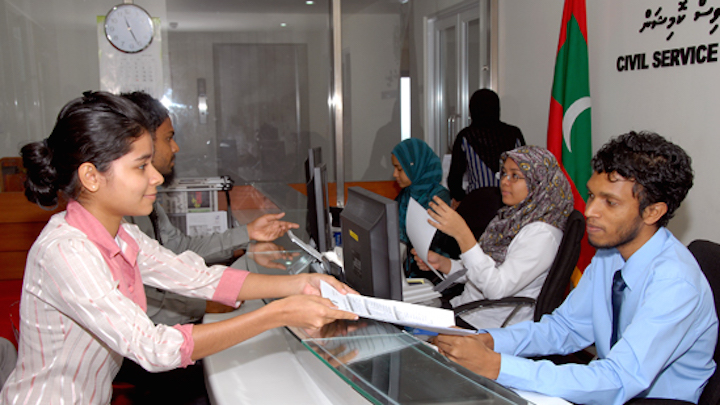The Fisheries Ministry has launched a training programme to teach long line fishing to youth in collaboration with the Maldives Industrial Fisheries Company (MIFCO).
Briefing the press this morning aboard a vessel designed for long line fishing, Fisheries Minister Dr Mohamed Shainee said it was important for local fishermen to be active in all areas of the country to prevent encroachment by foreign vessels as the coastguard could not patrol the entire Exclusive Economic Zone (EEZ).
“That would also reduce the illegal fishing from our waters. I believe with the [programme] starting today, our fishermen will go out further at sea, [which would] reduce the share of foreigners in long line fishing at present as much as possible, increase our productivity and create lots of new jobs for youth,” he said.
Long line fishing vessels travel 100 miles from the coast. In October 2011, Minivan News reported that the mass harvesting of fish stocks by foreign vessels was threatening the viability of the country’s tuna fishing industry.
Introducing long line fishing would lessen the dependency on one method of fishing, strengthen the industry’s resilience to external “shocks” and mitigate weakness of the fisheries industry, Dr Shainee said.
Long lining would also allow Maldivian fishermen to catch bigeye tuna, he added, which fetches a high price in the world market.
MIFCO Deputy Manager Ahmed Didi told reporters that the company’s target was to ensure that the youth who complete the training programme would have the capability to work in large yellowfin tuna fishing vessels “anywhere in the world”.
Ten fishermen from Haa Alif Hoarafushi were chosen for the first stage of the training programme, which was to be conducted by experts from MIFCO.
Dr Shainee also contended that long lining was the most environment-friendly method after the traditional pole and line fishing practiced in the country. The pole and line method has long made Maldivian tuna attractive to buyers from premium supermarkets in the UK and Europe.
Precautionary measures would be taken to reduce the impact on the environment, he added, explaining that new types of hooks were available to prevent by-catch of sharks and turtles.
In an interview with Minivan News last month, Dr Shainee noted that the fishing industry has felt the adverse effects of climate change caused by the rising temperature of surface waters.
“If the surface water gets a bit hot, then the fish swims deeper. So we need to penetrate through that layer of the ocean to get access to the fish. That is why we have already introduced long line fishing. That is to diversify from just one way of fishing,” he explained.
“Again, we will be very vulnerable if we commit to just one form of fishery. It is a good sign that in terms of income, we are meeting expectations by value in yellowfin and skipjack fishery. So we already have diversified into two forms of fishing.”
Environmental concerns
The annual fish catch in the Maldives declined from approximately 185,000 tonnes of fish caught in 2006 to about 70,000 tonnes in 2011.
In early 2010, the steady decline prompted the administration of former President Mohamed Nasheed to propose long lining as an alternative method.
In March 2010, the cabinet decided to allow long line fishing on the advice on the Fisheries Ministry.
Fishermen’s Union Chairman Ibrahim Manik told Minivan News at the time that “around 80 per cent of fishermen are against this new method, but the dire situation means there will be those who will adopt this.”
Manik said he expected Maldivian fishermen to be mindful of the ecological impact.
“Even now our fishermen will release any sharks they catch by mistake, so if our people do long lining they will be more careful,” he said.
An influential shark and marine conservation organisation from the UK, Bite Back, warned at the time that a boycott of long line tuna from the Maldives was a possibility if the government allowed long line fishing.
A year earlier, global retail giant Marks & Spencer announced it would no longer buy tuna that was not caught by pole and line.
However, director of private exporter Big Fish, Ali Riza, told Minivan News that the reaction of European consumers was hard to predict.
“It’s not us that overfished the waters, but now that it’s done, we are being told not to do what western countries had been doing,” he said at the time.
“We obviously can’t seal off our waters – fish are migratory. If we don’t do it others will overfish around us, so we might as well be the ones doing it.”
Likes (1)Dislikes
(1)Dislikes (0)
(0) 